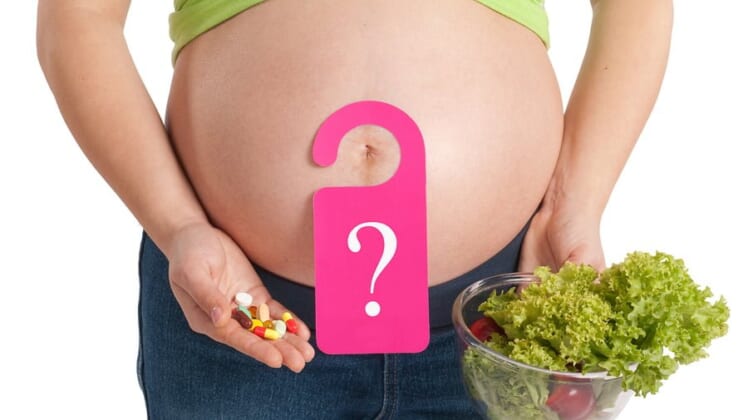The Guide to Pregnancy Safety- Food and Drugs to Avoid

When everything you consume has a direct route to your baby, it is easy to become paranoid about the safety of your food and drugs. Though this list is not all encompassing, it serves as a guide to provide you with a better understanding of what to avoid while pregnant.
Food
The following is a list of foods that every pregnant woman should try to avoid.
- High Mercury Seafood– Generally, large sized fish including shark, swordfish, tilefish, and albacore tuna contain high levels of mercury. Mercury also accumulates in people and can damage your baby’s brain, hearing and vision.
- Deli Meat– As convenient and high in protein some deli meats may be, it is time to think of some alternate lunch options because they are on the “do not eat” list. Meat based cold cuts along with hot dogs risk contamination with listeria, a food borne illness which enters into the bloodstream and can therefore travel through the placenta and straight to your baby. Listeria has even been known to cause miscarriage. If that cold cut sandwich is a must, heat the meat to 145-165 degrees Fahrenheit to kill the bacteria.
- Sushi– Like listeria, a majority of bacteria and parasites are killed by high heat. Therefore, a majority of raw foods, including fish, are on the list of foods to avoid.
- Prepared Deli Foods– The deli counter is a risky place. Macaroni salad and chicken salad, for example, are drenched in mayonnaise, a highly perishable condiment. If the refrigerated case is not monitored closely enough, or the food sits for too long, it is a breeding ground for bacteria. Make your own salads at home to reduce your risk of contamination.
- Unpasteurized Soft Cheeses– Always check the label on your cheeses, especially for soft cheeses like blue cheese, feta, queso fresco, and brie. Like deli meats, unpasteurized cheeses can harbor listeria. When in doubt, avoid it altogether.
- Raw Cookie Dough and Cake Batter– As tempting as it is, do not lick the spoon! The raw eggs in cookie and cake batters may contain salmonella, which is killed by high temperatures.
- Unpasteurized Juice and Milk– Always check the label of your milks and juices to be sure they are pasteurized. Pasteurization does a good job of killing bacteria, and eating unpasteurized foods is simply too risky. Unpasteurized juice and milk are prone to dangerous germs like E. Coli.
- Raw or Undercooked Sprouts– Sprouts including alfalfa, clover, mung bean, and radish may seem healthy, but they can harbor major bacteria. If you’re insistent on enjoying sprouts, be sure to heat them thoroughly.
- Alcohol– Alcohol can cause permanent damage on intellectual and physical growth when exposed to your unborn baby. No level of alcohol has been proven safe during pregnancy.
- Caffeine– Limit your caffeine intake to about 200 milligrams per day, which equals about 12 ounces or a bit more than one cup. Too much caffeine leads to increased risk of miscarriage, low birth weight, and stillbirth.
Medication
Most experts say it is best to avoid over the counter medication while pregnant unless it is completely necessary, especially during the first trimester when your baby is most vulnerable. Below is a list of the most common medications you should avoid along with some safer alternatives. Before taking any kind of over the counter medication, it’s strongly recommended that you clear it with your doctor first.
- Aspirin– Safer alternatives include acetaminophen such as Tylenol.
- Bismuth Subsalicylate (name brands include Pepto Bismol and Kaopectate) –This is especially contraindicated after 20 weeks of pregnancy.
- Brompheniramine– Brompheniramine is the active ingredient in cold and allergy medicines like Dimetapp Cold and Allergy. Safer alternatives include Claritin and Zyrtec.
- Caffeine– Not only is caffeine in coffee and tea, but it’s also in medications like Excedrin and Anacin. Do not exceed 200 mg daily.
- Chlorpheniramine– Advil Allergy & Congestion Relief, and Alka Seltzer Plus Cold Formula are not recommended, especially after 36 weeks of pregnancy.
- Ibuprofen– Pregnant women should avoid Advil and Motrin, and, if necessary, opt for acetaminophen brands like Tylenol.
- Naproxen– Naproxen is the active ingredient in Aleve, which is generally considered unsafe after the first trimester.
- Nicotine– All forms of cigarettes and tobacco are unsafe during pregnancy and this includes Nicoderm patches and Nicorette gum. If you need help to quit smoking, talk to your doctor about the safest method.
- Phenylephrine and Pseudoephedrine– These decongestants (brand names include Advil Cold & Sinus, Claritin-D, and Alka Seltzer Plus Day) should be avoided especially in the first 13 weeks of pregnancy due to possible links to birth defects.
You Might Also Like:
- The A-Z of Pregnancy and Exercise
- Too Much or Not Enough? The First Trimester Weight Gaining Guide
- Why Your Diet is Important to Your Baby, Even During the First Trimester
